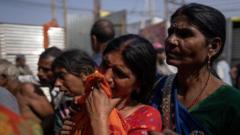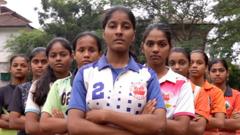In a harrowing case that has gripped the nation, a man convicted of raping and murdering a trainee doctor in Kolkata has been sentenced to life in prison, igniting public outrage and highlighting the ongoing safety concerns for women in India.
Life Imprisonment for Shocking Rape and Murder Case in Kolkata

Life Imprisonment for Shocking Rape and Murder Case in Kolkata
Court's decision stirs outrage as protests erupt over women's safety in India.
In a major judicial verdict on January 20, 2025, an Indian court sentenced Sanjay Roy to life imprisonment following his conviction for the brutal rape and murder of the young medical student, whose death sparked widespread protests across West Bengal. The incident, which occurred in August, sent ripples through the community and propelled women's safety issues to the forefront of political discourse.
Despite the pleas for the death penalty from the Central Bureau of Investigation, the victim’s family, and influential state leaders like Chief Minister Mamata Banerjee, the court ruled that the heinous acts did not meet the criteria for the death sentence, which applies in only "the rarest of the rare" cases. This decision has left many, including Rekha Sharma, a former chair of the National Commission for Women, deeply disappointed. She shared her sentiments with the press, noting, "the victim’s family and all of us are really sad" about the sentence.
Sanjay Roy, who had previously served as a volunteer with the Kolkata Police, maintained his innocence throughout the trial, claiming he was framed and stating that his confessions were coerced under duress. His assertions have raised questions about the integrity of the investigation led by local authorities, with many critics pointing fingers at the Kolkata Police for their handling of the case.
The fallout from the verdict has spurred protests in Kolkata, with demonstrators decrying the safety crisis for women in India. The case exemplifies a much larger problem in a country that continues to grapple with issues of gender-based violence and inadequate protection for women. As citizens voice their frustrations, this tragedy underscores the urgent need for systemic changes to address and improve women's safety nationwide.
Despite the pleas for the death penalty from the Central Bureau of Investigation, the victim’s family, and influential state leaders like Chief Minister Mamata Banerjee, the court ruled that the heinous acts did not meet the criteria for the death sentence, which applies in only "the rarest of the rare" cases. This decision has left many, including Rekha Sharma, a former chair of the National Commission for Women, deeply disappointed. She shared her sentiments with the press, noting, "the victim’s family and all of us are really sad" about the sentence.
Sanjay Roy, who had previously served as a volunteer with the Kolkata Police, maintained his innocence throughout the trial, claiming he was framed and stating that his confessions were coerced under duress. His assertions have raised questions about the integrity of the investigation led by local authorities, with many critics pointing fingers at the Kolkata Police for their handling of the case.
The fallout from the verdict has spurred protests in Kolkata, with demonstrators decrying the safety crisis for women in India. The case exemplifies a much larger problem in a country that continues to grapple with issues of gender-based violence and inadequate protection for women. As citizens voice their frustrations, this tragedy underscores the urgent need for systemic changes to address and improve women's safety nationwide.




















